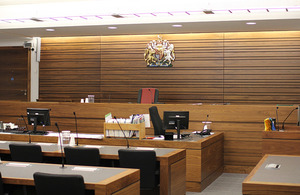Stopping poor quality and time-wasting expert evidence in family courts
New national standards to raise the quality of experts used in family courts were announced by the Government today.

New national standards to raise the quality of experts used in family courts and get rid of time-consuming evidence which adds little value in helping judges reach a decision were announced by the Government today.
In the latest stage of reforms to improve and speed up the family justice system, the Ministry of Justice has proposed introducing the new standards so evidence provided in a family court can only be given by qualified, experienced and recognised professionals.
For far too long there has been an increasing trend in England and Wales for expert witnesses to provide unnecessary and costly evidence – in the form of further written statements, clarifications and additional court appearances. This can cause major delays in child care cases and in the worst examples this has led to cases being forced to start again.
Under the new plans experts who are well-qualified and experienced will continue to provide their valuable service in advising the family courts – but the so-called experts who provide evidence which is simply not up to scratch will be driven out.
Family Justice Minister Lord McNally said:
“Poor quality expert evidence can lead to unacceptable delays for children and their families.
“By putting standards in place we will ensure only the highest calibre of evidence is permitted in family proceedings.
“We want to ensure that evidence being put forward is more robust and that cases are resolved more quickly. It is an opportunity we cannot afford to miss.”
This consultation is being jointly led by the Family Justice Council and follows the independent Family Justice Review by David Norgrove which identified weaknesses in the quality of evidence being put forward by experts at family proceedings involving children.
Dr Heather Payne, Chair of the Family Justice Council’s Experts Working Group, which drafted the standards said:
“The standards are designed to improve the quality, supply and use of expertise to improve outcomes for children in the family courts. They are intended to help experts and the courts alike, to ensure that they are delivering the relevant and high quality opinions based on the best possible evidence which the family courts need to help them make decisions.
“They also seek to provide the courts and lawyers with clear guidance on how to ensure that expert evidence is sought from an expert of the appropriate discipline, with appropriate professional qualifications.
“The standards are a first step to promoting the more effective and intelligent use of expert evidence.”
In the 12 months before October 2011, £52 m of legal aid was spent on expert reports and this consultation is designed to tackle the costs and delays brought about through poor quality evidence.
The Government has been working to bring down the average time taken for care cases to be concluded to 26 weeks, to reduce the impact on children involved. The average has already been cut from over 56 weeks to 45 weeks and reducing the delays created by expert witnesses is a key stage in continuing the good work.
The proposals will complement recent work by senior judges to ensure expert witnesses are only called when it is necessary.
The consultation will run until 18 July 2013. The Government will decide on its next steps when the consultation responses have been considered.
Notes to editors
- For more information, please contact the Ministry of Justice Press Office on 020 3334 3536.
- The consultation will run for nine weeks
- In January 2013 new Family Procedural Rules were published to restrict expert evidence to that which is only necessary to resolve the case.
- The Government’s response to the Family Justice Review. A young person’s version of the response is also available.
- The review panel, independently chaired by David Norgrove, was set up in January 2010 by the Ministry of Justice, Department for Education (formerly the Department for Children, Schools and Families) and the Welsh Government to look at all aspects of the family justice system from court decisions on taking children into care to disputes over contact with children when parents divorce. It gathered evidence from hundreds of people and groups with a personal and professional interest. It conducted two public consultations, and received 628 responses to the interim report published in March 2011.